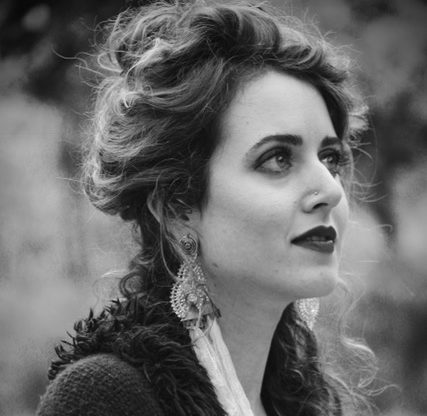 Courtesy of Chloe Pourmorady.
Courtesy of Chloe Pourmorady. Musician Chloe Pourmorady wears a large hamsa necklace and carries a rose-gold brass water bottle. She thinks before she speaks and she’s hip but with a kick of traditionalism in her veins, which probably stems from her Persian, Sephardic roots.
Pourmorady graduated from Beverly Hills High School in 2008 and studied classical music at Loyola Marymount University. “It’s radical right now [for] one of the first-generation [Iranian] Americans to have a career in the arts,” she said.
Pourmorady, 29, spoke with the Journal a couple of days after the release of her debut album “Begin Majesty,” with her seven-piece ensemble — the Chloe Pourmorady ensemble. She calls the album an amalgam of different elements, with music in Farsi, Ladino, Hebrew and English. Originally, she wanted to call it “Bipayan,” (Farsi for “endless”) but decided she needed a name that would attract a universal audience.
“It’s called ‘Begin Majesty,’ she said, “because it’s a command. Go forth, begin majesty — go forth and begin your beauty, your splendor, your creativity, your beginning.”
The album cover is a spectrum of light and dark brown, an image created by Elisabeth Louy, an artist in Ibiza, Spain, and the mother of a good friend of Pourmorady’s. Half of a woman’s face emerges from the various shades. Different people see different things, Pourmorady said, and it all depends on what’s going on inside you. However, she sees the image as “something emerging, like creation beginning.” The piece was made with coffee, oil and water — elements that typically don’t mix well together, she said.
She also calls on her Jewish roots for inspiration. “I use the texts. I use brachot,” she said. “I use the story of Bereshit — of the creation of the world — I use our morning prayer, Elohai Neshama. I use all of these concepts because I see creativity in Judaism.”
However, she added that she is always evolving as an artist “and I don’t like to identify with any label or genre or title or anything like that. It’s a little bit difficult to identify what you’re listening to because it’s a very natural combination of things that might not typically blend together.”
Indeed, there are a host of unexpected sounds on the album, including a song embellished with snapping and even the natural sound of a chair squeaking during the recording, Pourmorady said.

Pourmorady composes, plays the violin and the kamancheh (a traditional Persian bowed string instrument), and on her album sings with Cantor Liran Kohn, a cantor at Baba Sale Congregation in the Fairfax neighborhood. The other musicians in the ensemble are Daniel Raijman on guitar, Alexander Meimand on Persian tar, Zack Lodmer on clarinet, Ramin Abrams on bass, and master percussionists Jamie Papish and Ava Nahas.
“It’s radical right now [for] one of the first-generation [Iranian] Americans to have a career in the arts.”
— Chloe Pourmorady
Pourmorady’s father wrote the lyrics for most of the Farsi songs and she notes that he “had a big influence on my creativity.” She recalls the song he taught her — the one he wrote for her mother and sang at their engagement party. The song, she said, is called “Lebose Ghermez” (Red Dress), the color her mother wore at her engagement. Pourmorady described it as “one of the first songs I’ve ever loved in my life,” and she rearranged it for her parents’ wedding anniversary two years ago.
But even though she began to study the violin at the age of 9 (which Pourmorady said is late), she said she never thought she would make a career out of it. It wasn’t until her final year of high school that she knew she wanted to pursue music.
Her ensemble, she said, is something that she prayed for and wanted for a long time, and one by one, her fellow ensemble musicians came into her life. She met some of them through synagogue, others through friends and a few by accident.
The ensemble played its first concert at the Skirball Cultural Center in 2016. That’s the moment, “the ensemble was really the ensemble,” Pourmorady said. Today, the ensemble “are the best musicians I’ve ever played with in my life.” They work well together on all levels, she said, “creatively, personality-wise and even humor-wise.”
After three years of performing, the ensemble created a $40,000 Kickstarter campaign in September 2018 to make the “Begin Majesty” album. Within two months they had met their goal.
But Pourmorady said she ventured far out of her comfort zone during that time, asking people from the Persian and Jewish community for generous donations. She noted that her grandmother didn’t approve of her reaching out to donors. She recalled her grandmother saying, “What is she doing? She’s bringing a bad name to our family.”
Yet Pourmorady remains unapologetic. “I put out a beautiful work of art,” she said. “It was worth it in the end.”
Michelle Naim is a senior studying English with a concentration in journalism at Stern College for Women in Manhattan and a Jewish Journal summer intern.






















 More news and opinions than at a Shabbat dinner, right in your inbox.
More news and opinions than at a Shabbat dinner, right in your inbox.